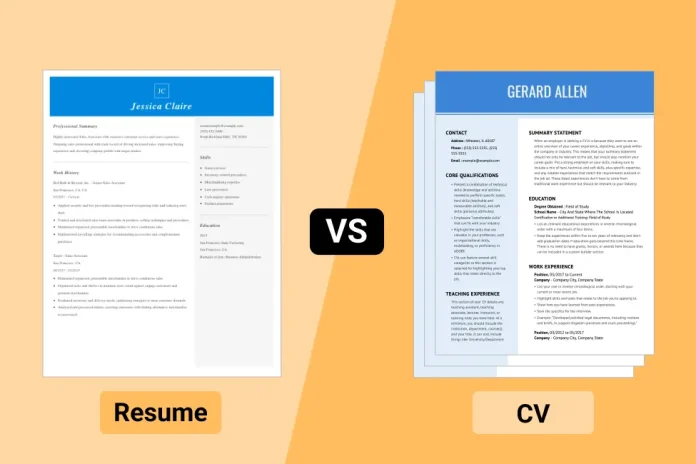What is the Difference Between CV and Resume?
Confused about the difference between a CV and a resume? You’re not alone! While both are commonly used in job applications, they are distinct in format, purpose, and content. Understanding these differences is essential to ensure you present the right document for the opportunity you’re pursuing. Let’s break it down.
Key Differences Between a CV and a Resume
1. Length
- CV (Curriculum Vitae):
A comprehensive document that can span 2-3 pages or more, detailing your complete academic and professional history. - Resume:
A concise, 1-2 page document summarizing your most relevant skills, experience, and qualifications tailored to the specific job.
2. Purpose
- CV:
Primarily used for academic, research, or education-related purposes. It’s common when applying for research programs, Ph.D. positions, or university faculty roles. - Resume:
Designed for job applications across industries. It highlights your professional achievements and is tailored to specific job requirements.
3. Content
- CV Includes:
- Detailed academic qualifications.
- Publications and research work.
- Certifications and honors.
- Professional affiliations.
- Resume Includes:
- Work experience and accomplishments relevant to the role.
- Skills tailored to the job description.
- Educational background (briefly listed).
4. Customization
- CV:
It is a static document that grows with your career and includes all your professional milestones. - Resume:
Highly customizable and tailored for each job application to emphasize the most relevant skills and experiences.
Comparison Table: CV vs. Resume
| Feature | CV | Resume |
|---|---|---|
| Length | 2-3 pages or more | 1-2 pages |
| Purpose | Academic, research, or education | General job applications |
| Content | Academic details, publications | Work experience, tailored skills |
| Customization | Universal, not tailored | Tailored for each job application |
| Use | Research programs, Ph.D., academia | Corporate and industry roles |
CV vs. Resume in Different Contexts
- In the United States:
Resumes are standard for most job applications, while CVs are used for academic and research roles. - In the European Union:
The terms CV and resume are often used interchangeably, both referring to a professional job application document.
Conclusion: Choosing Between CV and Resume
Understanding the difference between a CV and a resume helps you select the right format based on your goals.
- Use a Resume when applying for jobs in industries such as IT, marketing, or finance. Focus on tailoring it to the specific job.
- Use a CV for academic or research positions where your detailed career achievements and qualifications are essential.
By choosing the right document and tailoring it effectively, you’ll increase your chances of making a great impression. Now, you’re equipped to decide whether a CV or resume is the right fit for your next opportunity!
Also Read – How To Introduce Yourself In an Interview: A Step-by-Step Guide

